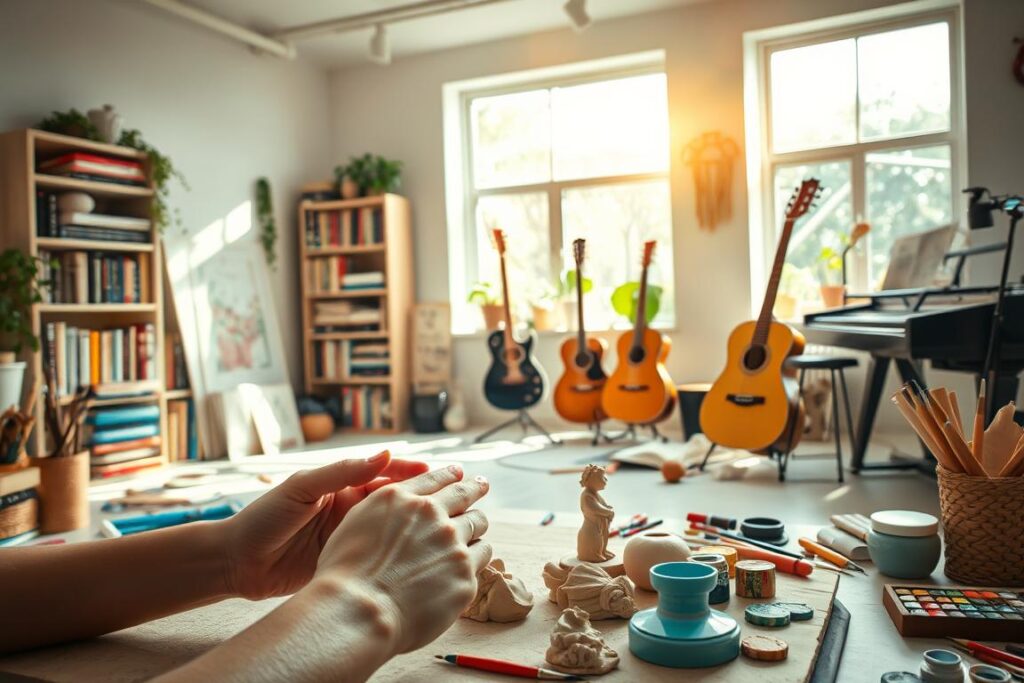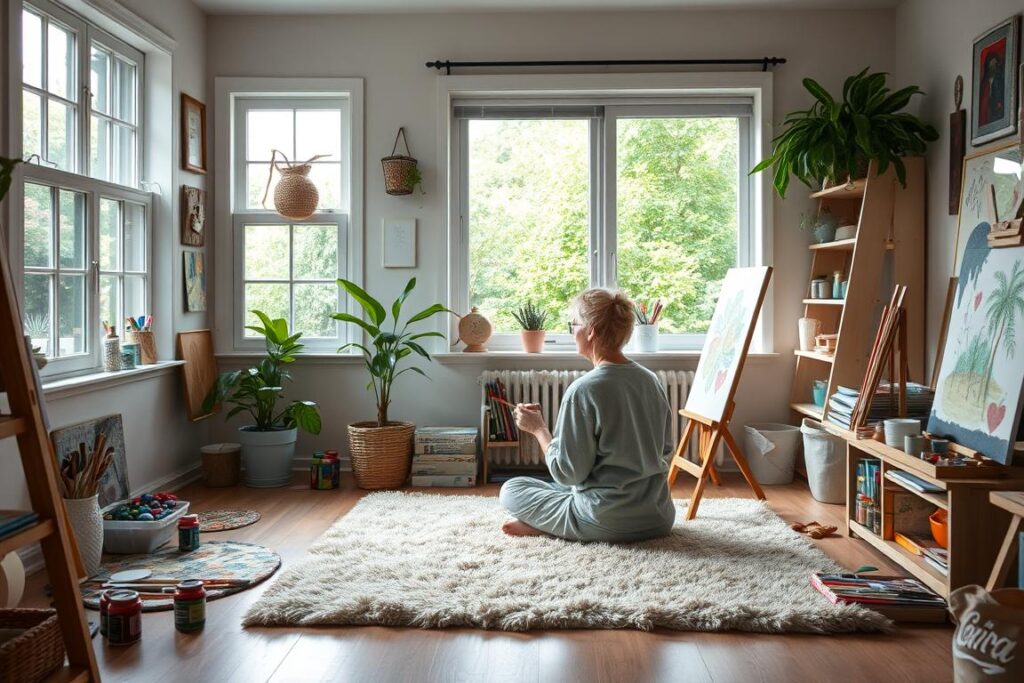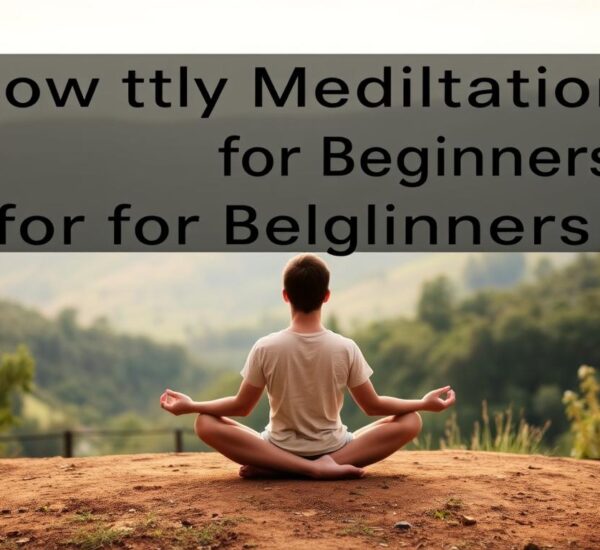Are you looking for a way to escape the daily grind and enrich your life? What if you could turn your leisure time into an opportunity for self-improvement and personal fulfillment?
We often underestimate the impact that our interests can have on our overall well-being. Doing things we enjoy can not only reduce stress but also help us grow personally. By trying new hobbies and caring for the ones we already have, we can improve our mental health and feel a sense of achievement.
As we navigate our busy lives, it’s essential to recognize the value of making time for the things that bring us joy. By doing so, we can create a more balanced lifestyle and cultivate a deeper understanding of ourselves.
Key Takeaways
- Engaging in hobbies can contribute to self-improvement and overall well-being.
- Pursuing interests can provide stress relief and enhance mental wellness.
- Nurturing hobbies can foster a sense of accomplishment and personal fulfillment.
- Making time for leisure activities is key for a balanced lifestyle.
- Exploring new hobbies can lead to new experiences and personal growth.
Understanding Hobbies and Their Importance
Hobbies are key to a more fulfilling life. They are activities we enjoy in our free time. They play a big role in personal development.
What Are Hobbies?
Hobbies are things we do for fun or to relax. They can be creative pursuits like painting or writing. Or physical activities like hiking or sports. Hobbies make our free time better and give us a sense of achievement.
Some common hobbies include:
- Gardening
- Photography
- Cooking
- Playing musical instruments
- Reading
Benefits of Having Hobbies
Hobbies have many benefits. They can lower stress and improve mental health. They also help us find ourselves and make new friends.
The benefits of hobbies are:
- They improve mental health and reduce stress
- They boost creativity and skills
- They help us connect with others
- They make us feel accomplished and boost self-esteem
How Hobbies Contribute to Personal Growth
Hobbies help us grow by challenging us and teaching new skills. Through hobbies, we discover new parts of ourselves. This leads to more confidence and a happier life.
For example, learning a new language improves our thinking and opens up new cultures. Sports or physical activities also improve our health and discipline.
Popular Hobbies for Personal Development
Exploring our passions through hobbies can greatly improve our well-being. Doing things we love not only makes us happy but also helps us grow. Let’s look at three hobbies that boost skill enhancement, passion pursuit, and mental wellness: reading, gardening, and photography.
Reading for Knowledge and Reflection
Reading is a hobby that offers many benefits. It increases our knowledge, sharpens our critical thinking, and helps us reflect. Through reading, we learn new things, see the world from different angles, and understand it better. As our article on unlocking your full capacity shows, reading is a powerful tool for growth.
Gardening for Mindfulness and Patience
Gardening is a hobby that greatly aids in personal development. It lets us connect with nature, practice mindfulness, and learn patience. Caring for plants and watching them grow is therapeutic. It teaches us about the value of care and dedication.
Photography to Enhance Creativity
Photography is a creative hobby that boosts our ability to see and appreciate beauty. It makes us more mindful of our surroundings and helps us capture special moments. Through photography, we express our creativity and develop our artistic vision.
| Hobby | Benefits | Skills Developed |
|---|---|---|
| Reading | Knowledge enhancement, critical thinking, reflection | Critical thinking, analytical skills |
| Gardening | Mindfulness, patience, connection with nature | Patience, nurturing skills |
| Photography | Creativity, observation, artistic expression | Creativity, attention to detail |
By taking up hobbies like reading, gardening, and photography, we can improve our personal growth. These activities not only bring joy but also give us valuable skills and perspectives. They enrich our lives in many ways.
Creative Hobbies that Fuel Self-Expression
Exploring creative hobbies opens up new ways to express ourselves and grow. These activities boost our skills and improve our well-being. Let’s dive into some creative hobbies that help us express ourselves and explore our interests.
Painting and Drawing: Unleash Your Inner Artist
Painting and drawing let us express our creativity and imagination. They are great for sharing our thoughts and feelings in a unique way. These hobbies also improve our fine motor skills and hand-eye coordination.
You don’t need to be a pro to start painting and drawing. Simple tasks like sketching and coloring are very helpful. Use different mediums like watercolors, acrylics, or pencils to show your personality through art.

Writing as a Tool for Growth
Writing is a powerful hobby for self-expression and growth. It lets us share our thoughts, reflect on experiences, and explore creativity. Writing can also be a way to relax and focus.
There are many ways to write, like journaling, blogging, or creative writing. Regular writing helps improve our communication skills and lets us find our unique voice. It also helps us understand ourselves better.
- Journaling for personal reflection
- Blogging to share your experiences
- Creative writing for self-expression
Crafting and DIY Projects: Hands-On Learning
Crafting and DIY projects are a hands-on way to be creative. They let us make something real and useful. Projects can be anything from knitting and sewing to woodworking and decorating.
Doing these projects improves our problem-solving, patience, and self-reliance. They also let us make special items for our homes or as gifts.
To begin with crafting and DIY, start with simple tasks like knitting a scarf or making a planter. As you get better, you can tackle more challenging projects.
Physical Hobbies that Promote Well-Being
We can greatly improve our health by adding physical hobbies to our free time. Doing physical activities boosts our health and clears our minds. This leads to better overall wellness.
Benefits of Regular Exercise
Regular exercise is key for physical hobbies that boost well-being. It improves heart health, lifts our mood, and gives us more energy. Adding exercise to our daily life improves both our body and mind.
Regular exercise offers many benefits:
- It makes our body healthier
- It sharpens our mind
- It helps us manage our mood better
- It boosts our energy
Team Sports and Social Interaction
Team sports are great for well-being through physical hobbies. They give us physical benefits and chances for socializing and building community. Playing team sports helps us learn teamwork, make friends, and grow our social circle.
Yoga and Meditation for Mental Clarity
Yoga and meditation are excellent for mental clarity and well-being. They help us lower stress, focus better, and be more mindful. By doing yoga and meditation, we find a balance between our body and mind.
For those wanting a healthy work-life balance, yoga and meditation are great choices. You can learn more about balancing work and life in our article on the ultimate guide to creating a healthy work-life.
| Physical Hobby | Physical Benefits | Mental Benefits |
|---|---|---|
| Regular Exercise | Improves cardiovascular health, increases energy | Boosts mood, improves mental clarity |
| Team Sports | Enhances physical health, builds strength | Fosters social interaction, builds teamwork skills |
| Yoga and Meditation | Improves flexibility, reduces stress | Enhances mindfulness, improves focus |
Learning Hobbies: Skills for Life
Learning hobbies makes our free time more fun and valuable. They help us grow personally and professionally. By trying new things, we find talents we didn’t know we had.
Cooking: A Gateway to Culinary Exploration
Cooking is more than just making food; it’s a way to explore cultures and tastes. It teaches us to be creative, patient, and detail-oriented. Plus, it lets us try new flavors and ingredients.
To start, try simple recipes and then move to harder ones. This builds your kitchen confidence and encourages you to try new foods.
Musical Instruments: Discipline and Joy
Playing a musical instrument is rewarding. It improves our thinking, memory, and can reduce stress. Plus, it makes us feel proud of our skills.
Begin with something easy like the ukulele or try the piano. The key is to keep practicing and be patient. As you get better, you can explore different music styles.
Coding: Navigating the Digital World
Coding is a key skill in today’s digital world. It lets us make software, apps, and websites. It also boosts our problem-solving and creative thinking.
Begin with easy programming languages like Python or JavaScript. There are many online resources and coding groups to help you learn.
Outdoor Hobbies for Connection with Nature
Outdoor hobbies can change our lives, making us feel better and more connected to nature. Exploring the outdoors brings new experiences, challenges, and ways to grow.
Outdoor hobbies mix adventure, relaxation, and personal growth. Activities like hiking, birdwatching, and camping help us bond with nature. They also improve our lives.
Exploring the Great Outdoors through Hiking
Hiking is great for seeing nature, getting fit, and enjoying the scenery. It lets us explore mountains, forests, and coastlines. We get to see nature’s beauty up close.
Benefits of Hiking:
- Improves physical health and fitness
- Enhances mental well-being and reduces stress
- Provides opportunities for exploration and adventure
Cultivating Patience and Observation through Birdwatching
Birdwatching teaches patience, observation, and love for nature. Watching birds helps us learn about their lives and why we need to protect them.
Benefits of Birdwatching:
- Develops patience and attention to detail
- Enhances knowledge of ornithology and ecology
- Promotes a sense of calm and connection with nature
Enjoying Simplicity and Adventure through Camping
Camping lets us escape daily stress and connect with nature’s simplicity. It’s a chance to relax, think, and spend time with loved ones, whether in the wilderness or a park.
Benefits of Camping:
- Provides an opportunity to disconnect from technology and recharge
- Fosters a sense of community and bonding with others
- Allows for a deeper appreciation of nature and the outdoors
Outdoor hobbies like hiking, birdwatching, and camping make our lives richer. They challenge us and help us connect with nature. As we enjoy nature, we also learn to protect it for the future.
Hobbies for Social Engagement and Networking
Exploring hobbies that boost social interaction opens doors to self-discovery and better mental health. Activities that bring people together can greatly improve our personal growth.
These hobbies help us make new friends and feel part of a community. They teach us how to communicate better, understand others, and see things from different angles.
Joining Clubs and Organizations
Being part of clubs or organizations is a fantastic way to meet others with similar interests. It could be a book club, sports team, or hiking group. Being in a community is very rewarding.
It helps us improve our social skills, boosts our confidence, and might even help our career.
Volunteering: Giving Back to Your Community
Volunteering is great for both helping others and improving our own happiness. It gives us a sense of purpose and fulfillment. Plus, it’s a chance to meet people who share our values, leading to new friendships and professional connections.
Participating in Meetups: Expanding Your Circle
Meetups are a fantastic way to meet new people and try new things. They can be anything from language exchange to tech events. This variety offers many chances to connect with others.
| Hobby | Social Benefits | Personal Development Benefits |
|---|---|---|
| Joining Clubs and Organizations | Meets new people with similar interests, builds community | Develops communication skills, builds confidence |
| Volunteering | Meets like-minded individuals, gives back to the community | Develops sense of purpose, enhances well-being |
| Participating in Meetups | Expands social circle, meets people with shared interests | Enhances networking skills, fosters new friendships |
By choosing hobbies that encourage socializing and networking, we can greatly improve our personal growth, self-awareness, and mental health. Whether through clubs, volunteering, or meetups, these activities bring many benefits to our lives.
Turning Hobbies into Side Hustles
Turning a hobby into a side hustle takes dedication, creativity, and a desire to learn. Many have made their passions profitable, finding fulfillment and financial stability.
To start this journey, understanding the steps is key. This process not only improves our skills but also opens new paths for growth and development.
The Path from Passion to Profit
The first step is to see if our hobby can make money. We need to look at our skills and figure out how to use them to earn. For example, a hobbyist photographer can work at events or sell photos online.
Key considerations include:
- Identifying market demand for our hobby-related skills
- Assessing the competition and finding a niche
- Developing a unique selling proposition (USP)
By carefully evaluating these factors, we can lay a strong foundation for our side hustle. This increases its success chances.
Marketing Your Skills Effectively
Good marketing is key to making our hobby profitable. We need to show off our skills and services to others. Using social media, creating a professional website, and networking are good ways to reach people.
Some effective marketing strategies include:
- Building a strong online presence through social media and a professional website
- Leveraging email marketing and newsletters to stay connected with clients
- Participating in relevant events and conferences to showcase our expertise
By using these strategies, we can market our skills well and attract new opportunities.
Balancing Hobby and Work Life
As we turn our hobby into a side hustle, keeping a balance is vital. We need to set boundaries, manage our time well, and take care of ourselves.
Tips for achieving balance include:
- Establishing a dedicated workspace to separate work and hobby time
- Creating a schedule that allows for both work and hobby activities
- Prioritizing self-care and taking breaks to avoid burnout
By balancing our work and hobby life, we can enjoy our side hustle while staying well.
The Role of Hobbies in Mental Health
Hobbies are key to keeping our minds healthy. They make us happy, challenge us, and give us a sense of pride. We’ll see how hobbies help with stress, mindfulness, and being resilient.
Leisure activities, like hobbies, are vital for our mental health. They give us a break from daily stress, letting us recharge. Doing things we love can take our minds off worries, lift our mood, and improve our mental health. For example, hobbies can lower anxiety by focusing us on the present moment.
Stress Relief Through Leisure Activities
Leisure activities are great for reducing stress. When we do hobbies, our stress goes down. Activities like painting, gardening, or playing music are very effective. They let us express feelings and feel accomplished.
For more tips on managing stress, check out our article on stress-less living. It offers practical advice for balancing work and life.

Mindfulness Practices and Their Effects
Mindfulness in hobbies like meditation, yoga, or gardening greatly benefits our mental health. These activities help us stay in the moment, reducing worries about the past or future. Regular mindfulness can lower stress, improve emotional control, and increase self-awareness.
Adding mindfulness to our hobbies can make them even more beneficial for our mental health. For example, focusing on the senses while gardening or the creative flow while painting can turn these activities into mindfulness exercises. This promotes a deeper sense of calm and well-being.
Building Resilience Through Challenges
Hobbies also help build resilience. Doing challenging activities, like learning a new skill or tackling a big project, helps us develop coping strategies and learn from failures. This builds our resilience, helping us handle life’s challenges better.
Also, overcoming obstacles in hobbies boosts our confidence and self-esteem, improving our mental health. By facing challenges in our leisure activities, we build a resilient mindset that benefits many areas of our lives.
Lifelong Learning and Evolving Hobbies
Hobbies are a lifelong journey of growth and exploration. Our interests and hobbies can change as we grow and face new situations. This shows our personal growth and changing life.
Embracing Change and New Interests
Embracing change is key to lifelong learning. It keeps us open to new experiences and hobbies. This way, our hobbies stay vibrant and fulfilling.
Being open to new experiences is essential. It means stepping out of our comfort zones and trying new things. Even if they’re not long-term passions, it’s worth a try.
How to Discover New Hobbies
Finding new hobbies can be thrilling and a bit scary. To begin, we can explore different categories of hobbies. This includes creative pursuits, outdoor activities, or intellectual challenges. We can find what truly interests us.
- Researching online for ideas and inspiration
- Asking friends or family members about their hobbies
- Trying out a new activity or class
The Importance of Resilience and Adaptability
Resilience and adaptability are critical when trying new hobbies or changing our interests. Not every hobby will be perfect for us. That’s okay. The important thing is to be resilient in the face of challenges and adaptable to new information or changing circumstances.
By being resilient and adaptable, we can confidently explore and develop new hobbies. This ensures a lifelong journey of personal growth and happiness.
Tips for Balancing Hobbies with Daily Life
It can be tough to balance hobbies with daily life. But, with the right strategies, you can enjoy your hobbies and keep up with your duties. Hobbies are key for self discovery and mental wellness. They let you explore your interests and relax.
Effective Time Management
To balance hobbies with daily life, time management is key. Set aside specific times for your hobbies and stick to it. This way, you can make time for leisure without neglecting your daily tasks.
Dedicated Space for Hobbies
Having a dedicated space for hobbies can make a big difference. It could be a home office for writing or a studio for painting. A dedicated space keeps you organized and focused on your hobbies.
Realistic Goals and Expectations
Setting realistic goals and expectations is important. Know what you want to achieve with your hobbies and set goals you can reach. This keeps you motivated and lets you enjoy your hobbies without feeling stressed.
## FAQ
### Q: What are the benefits of having hobbies for personal growth?
A: Hobbies can make our lives richer, reduce stress, and help us connect with others. They lead to personal growth and development.
### Q: How can I choose a hobby that suits me?
A: To find a hobby that fits, think about what you like, what you’re good at, and your personality. Try different activities to see what you enjoy and excel at.
### Q: What are some popular hobbies for personal development?
A: Good hobbies for growth include reading, gardening, photography, painting, writing, and coding. They boost our skills, creativity, and mental health.
### Q: Can hobbies really help with stress relief and mental health?
A: Yes, hobbies are great for stress relief and mental health. They offer a break, promote mindfulness, and build resilience.
### Q: How can I balance my hobbies with daily life?
A: To balance hobbies and daily life, manage your time well, have a hobby space, and set achievable goals. This helps maintain a healthy balance.
### Q: Can I turn my hobby into a side hustle?
A: Yes, you can turn a hobby into a side business. Identify your passion, market your skills, and balance work and hobby life. This can make your hobby profitable.
### Q: How do I discover new hobbies as I grow and evolve?
A: Discover new hobbies by embracing change, exploring new interests, and being open to experiences. This fosters a growth mindset and adaptability.
### Q: Are outdoor hobbies beneficial for our well-being?
A: Yes, outdoor hobbies like hiking, birdwatching, and camping are good for us. They improve our nature appreciation, patience, and observation skills, and boost physical and mental health.
### Q: Can hobbies help us develop new skills?
A: Yes, hobbies like cooking, playing musical instruments, or coding can teach new skills. These skills enhance personal growth, creativity, and job prospects.
### Q: How can I make time for my hobbies?
A: Make time for hobbies by prioritizing them, scheduling, and being consistent. This ensures a healthy balance between hobbies and daily life.
### Q: What are some creative hobbies that can fuel self-expression?
A: Creative hobbies like painting, drawing, writing, and crafting boost self-expression and personal growth. They improve our creativity, skills, and self-improvement.



